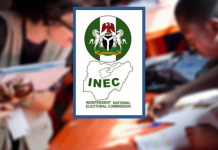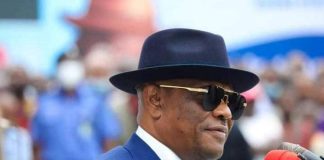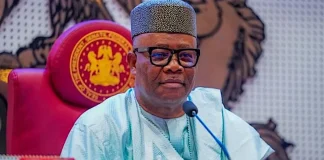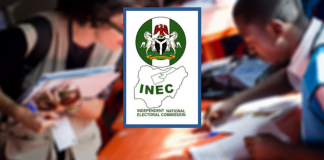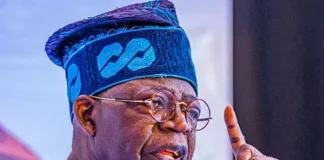🌿 Ruzu Non-Alcoholic Herbal Bitters
Ruzu Non-Alcoholic Herbal Bitters is a natural health supplement specially formulated to:
- ✅ Promote general wellness
- ✅ Detoxify the body
- ✅ Support the treatment of various ailments
Made from a powerful blend of 100% organic and medicinal herbs, Ruzu is completely alcohol-free, making it ideal for:
- 👪 All age groups
- 🌱 Health-conscious individuals
- 🌿 Anyone seeking non-alcoholic herbal remedies
Whether you're looking to boost your vitality, cleanse your system, or support healing the natural way, Ruzu Bitters offers a trusted herbal solution.
The outgoing year is one of mixed fortunes for the nation’s electoral umpire, the Independent National Electoral Commission (INEC). It could thumb its chest for successful conduct of certain off-season elections; it has shown genuine efforts to sanitise the electoral process. It, however, suffered some losses, occasioned by natural disasters. TAIWO AMODU gave a diary of events in the year at INEC under Professor Mahmood Yakubu.
Flood ravages INEC:
Following heavy downpour on May 23, the Commission office in Benin, Edo state capital was heavily flooded, leading to damage to movable and immovable items.
The natural disaster almost threatened the Edo State governorship election as enrolment machines already configured for the Continuous Voters Registration were damaged.
CVR swells voters registers in Edo, Ondo
Ahead of the off-season elections in Edo and Ondo states, Sam Olumekun, INEC National Commissioner and Chairman, Information and Voter Education Committee, announced last June, 269,992 as new voters in the two states.
September: APC supplants PDP, as Okpebholo wins Edo
The governorship candidate of the All Progressives Congress (APC) in Edo State, Monday Okpebholo, was declared the winner of governorship election in the state. The INEC Returning Officer for the election, Faruk Kuta, announced the final results after collating results from the 18 local government areas of the state. The returning officer said Mr Okpebholo polled 291,667 votes to defeat his closest challenger and candidate of the Peoples Democratic Party (PDP), Asue Ighodalo, who scored 247,274 votes. The candidate of the Labour Party (LP), Olumude Akpata, came a distant third with 22,763 votes. The final results showed that Okpebholo won in 11 local government areas in the state while Ighodalo won in seven. The candidate of the Labour Party, Mr Akpata, did not win in any local government area.
October: INEC ignores APC, Makinde’s demand for Ondo REC’s removal
Oyo State governor, Seyi Makinde had demanded for removal of the Ondo State Resident Electoral Commissioner, Toyin Babalola. At the PDP rally in Akure, the Oyo State Governor had claimed that the REC is from Ondo State. He said, “This message is for the INEC national chairman, Professor Yakubu Mahmood. You must remove the Resident Electoral Commissioner in Ondo State, Mrs Oluwatoyin Babalola. She’s from Ondo State,” Makinde said. “What you did in Edo, you can’t do it in Ondo.” The commission, in a statement on its X account, later debunked the claim that Babalola is an indigene of Ondo, adding that it is against the commission’s policy to deploy REC to his or her statement of origin. “For the avoidance of doubt, Mrs Babalola is not from Ondo State in line with the Commission’s policy not to deploy a REC to his or her state of origin,” the statement read in part.
November 17: Aiyedatiwa wins
Ondo State governor, Mr Lucky Ayedatiwa, was declared the winner of governorship election in the state. He was returned elected by the Independent National Electoral Commission after winning the governorship poll in all 18 Local Government Areas of the state. In the final declaration of the result by the State Returning Officer, Professor Olayemi Akinwumi, he said the All Progressives Congress’ candidate, Ayedatiwa polled in total of 366,781 votes to defeat Agboola Ajayi of the Peoples Democratic Party, who got 117,845 votes.
December 2: Fire outbreak in Delta
A fire outbreak at the Commission Owa-Oyibu office in the Ika North East Local Government Area of Delta State, caused by power surge, destroyed 706 ballot boxes, 50 election bags, 322 apron vests, three electric generators, 140 stamps, and 50 ballot box seals. INEC National Commissioner, Sam Olumekun, however, noted that “no injuries or fatalities were recorded during the incident.”
December 13: INEC mulls phase out of PVCs:
At a meeting with its Resident Electoral Commissioners, INEC chairman, Professor Mahmood Yakubu revealed that his leadership was proposing sweeping reforms to improve the country electoral process. Among the reforms being proposed is the phasing out of the use of Permanent Voters Cards during elections. He stated that INEC would soon present these proposals and more to the relevant committees in the Senate and House of Representatives. He said: “Among the major highlights of the commission’s recommendations is the imperative of legal clarity in result management, with regard to manual transfer versus the electronic transmission of results.
“The commission also believes that with the introduction of the Bimodal Voter Accreditation System, the use of the Permanent Voter Cards as the sole means of identification for voter accreditation on election day should be reviewed. Those who already have the PVCs can still use them to vote, but going forward, computer-generated slips issued to the voter or even downloaded from the commission’s website will suffice for voter accreditation. This will not only save cost; it will also eliminate the issues around the collection of PVCs and the diabolical practice of buying up the cards from voters in order to disenfranchise them.”
READ ALSO: Stop collaborating with politicians to rig elections, SDP’s Adebayo tells INEC


